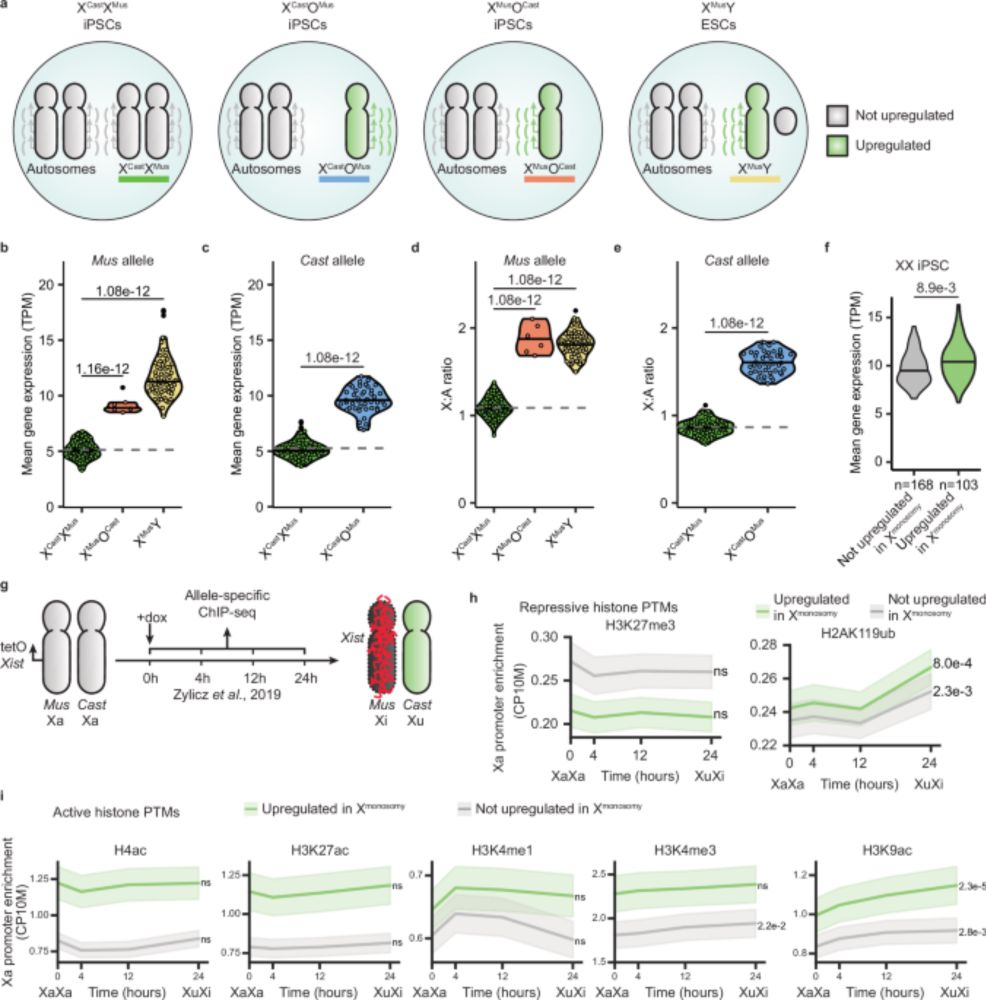
A big thanks to all collaborators and funders, in particular: Claire Rougeulle @crougeulle.bsky.social, Jean-François Ouimette @jfouimette.bsky.social
Great contributions from Joost Gribnau, Kathy Niakan @niakanlab.bsky.social, Peter Rugg-Gunn, and others.
A big thanks to all collaborators and funders, in particular: Claire Rougeulle @crougeulle.bsky.social, Jean-François Ouimette @jfouimette.bsky.social
Great contributions from Joost Gribnau, Kathy Niakan @niakanlab.bsky.social, Peter Rugg-Gunn, and others.
Unlike mice, the inactive X chromosome of extraembryonic cells adopts an unusual chromatin landscape, revealing species-specific epigenetic events for the establishment of X inactivation in extraembryonic cells.
Unlike mice, the inactive X chromosome of extraembryonic cells adopts an unusual chromatin landscape, revealing species-specific epigenetic events for the establishment of X inactivation in extraembryonic cells.
Using the loss of function approach, we show that without XIST, extraembryonic cells fail to establish X-chromosome inactivation, providing the first formal proof that XIST is required for X-chromosome inactivation in humans.

Using the loss of function approach, we show that without XIST, extraembryonic cells fail to establish X-chromosome inactivation, providing the first formal proof that XIST is required for X-chromosome inactivation in humans.
Is XIST required to initiate X-chromosome inactivation in early human extraembryonic lineages?
Is X-chromosome inactivation required for female human embryo development?
𝐎𝐮𝐫 𝐧𝐞𝐰 𝐰𝐨𝐫𝐤 𝐭𝐚𝐤𝐞𝐬 𝐚 𝐦𝐚𝐣𝐨𝐫 𝐬𝐭𝐞𝐩 𝐭𝐨𝐰𝐚𝐫𝐝 𝐬𝐨𝐥𝐯𝐢𝐧𝐠 𝐭𝐡𝐢𝐬 𝐩𝐮𝐳𝐳𝐥𝐞.
Is XIST required to initiate X-chromosome inactivation in early human extraembryonic lineages?
Is X-chromosome inactivation required for female human embryo development?
𝐎𝐮𝐫 𝐧𝐞𝐰 𝐰𝐨𝐫𝐤 𝐭𝐚𝐤𝐞𝐬 𝐚 𝐦𝐚𝐣𝐨𝐫 𝐬𝐭𝐞𝐩 𝐭𝐨𝐰𝐚𝐫𝐝 𝐬𝐨𝐥𝐯𝐢𝐧𝐠 𝐭𝐡𝐢𝐬 𝐩𝐮𝐳𝐳𝐥𝐞.
In mice, X-chromosome dosage compensation is absolutely essential for early female embryo development.
But humans are different!
Recent advances revealed that 𝐭𝐡𝐞 𝐭𝐢𝐦𝐢𝐧𝐠, 𝐝𝐲𝐧𝐚𝐦𝐢𝐜𝐬, 𝐚𝐧𝐝 𝐜𝐡𝐫𝐨𝐦𝐚𝐭𝐢𝐧 𝐟𝐞𝐚𝐭𝐮𝐫𝐞𝐬 𝐨𝐟 𝐗-𝐜𝐡𝐫𝐨𝐦𝐨𝐬𝐨𝐦𝐞 𝐢𝐧𝐚𝐜𝐭𝐢𝐯𝐚𝐭𝐢𝐨𝐧 𝐢𝐧 𝐡𝐮𝐦𝐚𝐧𝐬 𝐝𝐢𝐟𝐟𝐞𝐫 𝐩𝐫𝐨𝐟𝐨𝐮𝐧𝐝𝐥𝐲 𝐟𝐫𝐨𝐦 𝐦𝐢𝐜𝐞.
In mice, X-chromosome dosage compensation is absolutely essential for early female embryo development.
But humans are different!
Recent advances revealed that 𝐭𝐡𝐞 𝐭𝐢𝐦𝐢𝐧𝐠, 𝐝𝐲𝐧𝐚𝐦𝐢𝐜𝐬, 𝐚𝐧𝐝 𝐜𝐡𝐫𝐨𝐦𝐚𝐭𝐢𝐧 𝐟𝐞𝐚𝐭𝐮𝐫𝐞𝐬 𝐨𝐟 𝐗-𝐜𝐡𝐫𝐨𝐦𝐨𝐬𝐨𝐦𝐞 𝐢𝐧𝐚𝐜𝐭𝐢𝐯𝐚𝐭𝐢𝐨𝐧 𝐢𝐧 𝐡𝐮𝐦𝐚𝐧𝐬 𝐝𝐢𝐟𝐟𝐞𝐫 𝐩𝐫𝐨𝐟𝐨𝐮𝐧𝐝𝐥𝐲 𝐟𝐫𝐨𝐦 𝐦𝐢𝐜𝐞.
#blastoids #stemcells #KULeuven @kuleuvenuniversity.bsky.social
#blastoids #stemcells #KULeuven @kuleuvenuniversity.bsky.social


